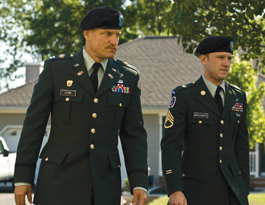home | metro silicon valley index | movies | current reviews | review

UNWELCOME VISITORS: Woody Harrelson (left) and Ben Foster play military men who must tell families about the deaths of soldiers in 'The Messenger.'
Bearing Bad News
Two soldiers must tell the living about the dead in 'The Messenger'
By Richard von Busack
WOODY HARRELSON may be the John Wayne our war in Iraq deserves. If Harrelson's newest, The Messenger, seems to run off the rails, it may have been intended to be the kind of movie that wasn't supposed to be on the rails in the first place. Here is an effort to make a small-camera movie about the Iraq war veterans trying to cope with the sorrow and wrath. Made in the shadow of The Last Detail, The Messenger has a profane streak; and like that Robert Towne movie, it features a pair of soldiers on a sort of liberty leave—at least, they're unsupervised and on the road sometimes. Harrleson's Capt. Stone is a CNO (Casualty Notification Officer), one of the pair of soldiers who turn up on doorsteps to regret to inform. He seems self-assured—he's an easy-going Southern girl-chaser. And he feels there's a system behind what he's doing—"Do not touch the NOK [next of kin]." Stone has enough of a sense of humor to put "The Funeral March" on his ringtone. Stone's new partner, Sgt. Montgomery (Ben Foster), is a simmering, tattooed fan of punk rock; he's scarred from the war and is boiling with his own contempt for the civilians around him.The horror of this assignment seems realistic. The Messenger seems to have inside details about what needs to be done, such as the importance of getting to the fateful doorstep first before the blogs or the newspapers. And the two-man team keep the pity for themselves and not for the survivors. The first persons we see informed—the pregnant fiancee and the mother of the killed-in-Iraq soldier—blow up, howling: it's clear it's a job for which there is no real preparation. But we start to see celebrity actors playing the bereaved: Steve Buscemi as a spitting, furious father; Samantha Morton, plumped and cushiony, with hair swept back to look like late-period Ann-Margret. That's when the film's previous death's-head irony starts to grow a little familiar and domestic.One can't stop watching Harrelson, who—despite cartoony work this year—seems on the verge of something great. He's already an assured movie star, and The Messenger is proof that he is much more than that. No one today can do the way-outside man who has something to teach as well as Harrelson, and while Zombieland parodied that kind of man, this demonstrates that Harrelson can do it straightforward. It's a Wayne world he inhabits: he's a seasoned soldier too cracked by his own experience to fit in to a peaceable world.
Writer-turned-director Oren Moverman did the research; the slang sounds right (the soldiers use the word "Jody" to describe the guy who stayed behind and helped himself to your girlfriend). He also uses ideas and symbols that could have been done without; the first shot of Sgt. Montgomery, putting eye drops in his wounded eye, all but says, "This man cannot weep." And the last third seems particularly shook up—a little drinking and fighting, a little bonding, this way to the hopeful ending. The locations, in New Jersey's aluminum-siding belt, give the story some kind of realism, and Morton's sober, delicate acting seems right. Inside this movie is a much harsher and bigger film, and Harrelson might have shown the way to it.
![]() THE MESSENGER (R; 105 min.), directed by Oren Moverman, written by Moverman and Alessandro Camon, photographed by Bobby Bukowski and starring Woody Harrelson and Ben Foster, opens Nov. 20 at Camera 3 in San Jose.
THE MESSENGER (R; 105 min.), directed by Oren Moverman, written by Moverman and Alessandro Camon, photographed by Bobby Bukowski and starring Woody Harrelson and Ben Foster, opens Nov. 20 at Camera 3 in San Jose.
Send a letter to the editor about this story.
|
|
|
|
|
|